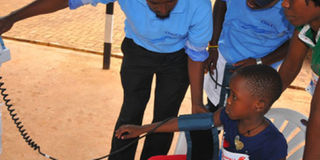How to manage blood pressure in children

What you need to know:
According to health experts, paediatric high blood pressure could also result from chronic lung diseases and having abnormal sugar levels. Obesity also remains a contributing factor to childhood high blood pressure, just as is the case with adults
Often times, having high blood pressure has been associated with overweight, older people. However, doctors say younger people are now diagnosed with diabetes. Dr Yaser Abdallah, a paediatrician at International Hospital Kampala (IHK), says high blood pressure happens when the force of blood pushes against the wall of the arteries. When the heart beats, it pumps blood into the arteries, and blood pressure is highest when the heart beats, pumping the blood.
“In children, cases of hypertension depend on various factors. For instance, blood pressure can result in abnormalities such as the narrowing of the aorta that drains blood from the heart to the rest of the body. When vessels are damaged, it makes the heart push hard against the blood vessels, which leads to blood pressure,” he says.
Dr Abdallah says organ-related abnormalities such as kidney cancer are also associated with paediatric high blood pressure. “Tumours disrupt the functioning of the kidney to be able to clear excess water in the body, which may therefore result in rising of the blood pressure.
According to health experts, paediatric high blood pressure could also result from chronic lung diseases and having abnormal sugar levels. Obesity also remains a contributing factor to childhood high blood pressure, just as is the case with adults.
Dr Abdallah says treatment depends on the degree of the blood pressure. “If the child’s blood level is high but without symptoms, they may need a period of observation, change in lifestyle and diet, regular exercise and frequent medical check-up,” he says.




